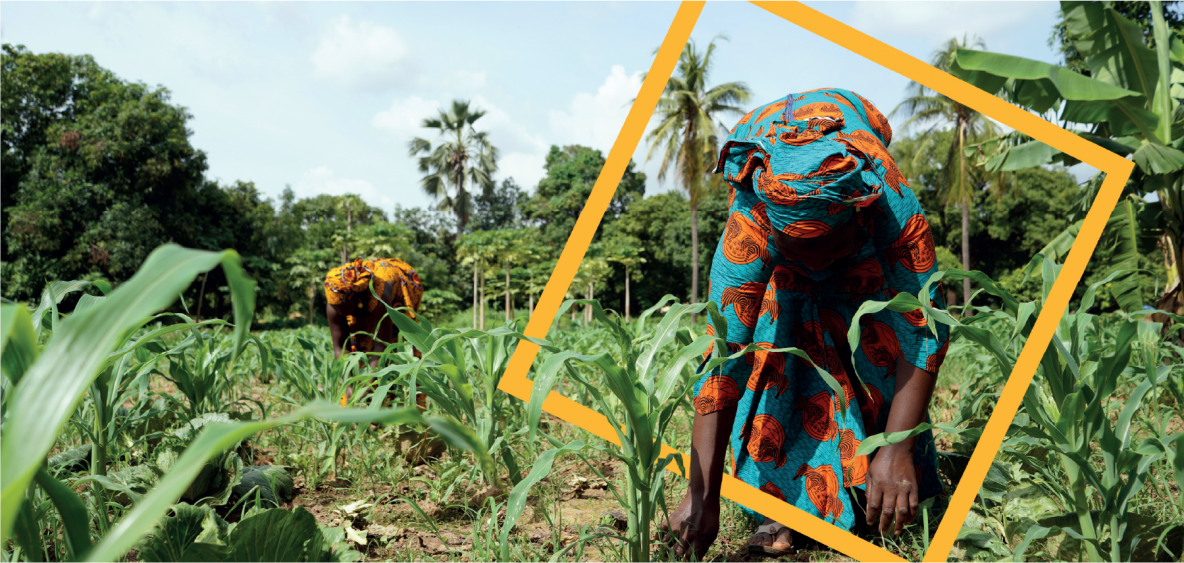
The RFS 2020 Annual Report showcases the achievements and innovations of the RFS regional partners, country project teams and beneficiary communities as they work together to enhance the long-term resilience and sustainability of smallholder farming systems across 12 African countries.
24 MARCH 2021: The Resilient Food Systems (RFS) programme published its 2020 Annual Report, which showcases the achievements and innovations of the RFS regional partners, country project teams and beneficiary communities across 12 targeted countries.
Led by the International Fund for Agricultural Development (IFAD), RFS is one of the three Integrated Approach Pilot programmes financed by the Global Environment Facility (GEF) during the Sixth Replenishment Cycle (GEF-6). The programme works with some of the most vulnerable populations in sub-Saharan Africa to increase the resilience, productivity and sustainability of smallholder agricultural systems while generating global environmental benefits.
Prior to the COVID-19 pandemic, smallholder farming communities in the dryland regions of Africa already faced a number of significant challenges.
With Africa’s population set to double by 2050, demand for food will rise sharply in a region where agricultural intensification, overgrazing and unsustainable agricultural practices have degraded natural resources. Smallholder farmers face increasingly poor soil quality and the lowest crop yields in the world, resulting in poverty, vulnerability to climate change and extreme weather events, and chronic food insecurity: 73 million people in the continent are acutely food insecure and one-quarter of the population is undernourished.
“The pandemic has shone a spotlight on the drivers behind some of the most pressing challenges facing our agricultural systems—climate change, environmental damage and biodiversity loss— and created a renewed sense of urgency for transformational change.”JYOTSNA PURI
Director, Environment, Climate, Gender and Social Inclusion Division International Fund for Agricultural Development
In times of crisis, these smallholder communities are affected the most—either directly through sickness and loss of life or indirectly through the ripple effects of economic recessions, at home and abroad, that continue to hit rural communities for years after the crisis has subsided.
The pandemic showed how external shocks intersect with existing challenges—land degradation, unproductive agricultural practices, insecure livelihoods, climate change, among others—to exacerbate long-term drivers of vulnerability in smallholder food systems.
Despite these challenges, RFS projects and beneficiary communities adapted to the changing environment. In many ways, the integrated nature of the programme, which promotes the use of innovative approaches to complex problems, provided RFS projects with the tools and skills necessary to meet the demands of the ‘new normal’. In spite of the ongoing pandemic and desert locust crisis in the Horn of Africa, RFS projects were able to focus on building the resilience of smallholder farming communities and ecosystems to stresses and shocks—now and in the future.
“We are seeing a lot of households saying ‘thanks, but no thanks’ to food aid in the communities where we work.”LYNN KOTA
Project Coordinator, Climate-Smart Agriculture for Climate-Resilient Livelihoods, Eswatini Winner of the 2020 Temvelo Award for achievements in biodiversity conservation
The report highlights the considerable progress that has been made toward programme targets. Through the 12 country projects and Regional Hub, the programme has engaged over 1.4 million beneficiaries, building skills in local natural resource management, sustainable agricultural practices, the development of new value chains and alternative income generating activities and monitoring and evaluation.
Through these efforts at the community level, over 150,000 hectares of previously degraded land have been restored through mechanical and agronomic interventions. The adoption of sustainable practices has greatly contributed to land restoration goals—over 160,00 farmers have been trained by RFS projects in sustainable land management approaches and technologies.
To ensure the sustainability of these results, RFS has been working with national and sub-national governments to bring together the right stakeholders in the appropriate forums to effectively align policy and institutional frameworks with realities on the ground. Across the 12 country projects, the programme has established 19 national and 51 sub-national multi-stakeholder platforms and influenced 8 policies, policy instruments and regulatory frameworks focused on integrated natural resource management.
“The focus on delivering integrated solutions through the Resilient Food Systems programme has emerged as an invaluable approach for helping smallholder farmers build resilience in the face of such risks and shocks.”GUSTAVO FONSECA
Director of Programs, The Global Environment Facility
The 2020 reporting period was marked by continual learning. Valuable lessons drawn from the achievements and innovations of the RFS country projects and Regional Hub will not only inform the programme’s implementation in the years to come, but can also provide helpful insights for other initiatives, governments and implementation partners working to enhance the long-term sustainability and resilience of food systems around the world.
The lessons, successes and experiences of RFS will feed into the preparation of the GEF-7 Impact Programmes, creating synergies between the ongoing GEF-financed projects and the design of initiatives through the new four-year investment cycle.
For much of the programme, 2021 is expected to mark the beginning of a return to normalcy. As government restrictions are lifted, many of the activities postponed because of COVID-19 are continuing where they left off. New partnerships, events, activities and milestones will bring the programme closer to achieving its goal of supporting the long-term sustainability and resilience of sub-Saharan Africa’s food systems.
Subscribe to our monthly newsletter to receive updates on stories directly from the field across all our projects, upcoming events, new resources, and more.